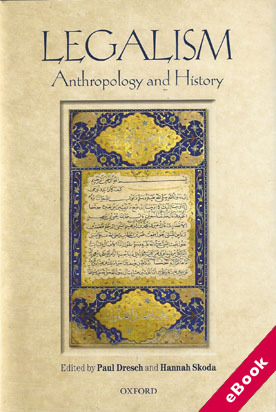
The device(s) you use to access the eBook content must be authorized with an Adobe ID before you download the product otherwise it will fail to register correctly.
For further information see https://www.wildy.com/ebook-formats
Once the order is confirmed an automated e-mail will be sent to you to allow you to download the eBook.
All eBooks are supplied firm sale and cannot be returned. If you believe there is a fault with your eBook then contact us on ebooks@wildy.com and we will help in resolving the issue. This does not affect your statutory rights.
Law and law-like institutions are visible in human societies very distant from each other in time and space. When it comes to observing and analysing such social constructs historians, anthropologists, and lawyers run into notorious difficulties in how to conceptualize them. Do they conform to a single category of 'law'? How are divergent understandings of the nature and purpose of law to be described and explained?
Such questions reach to the heart of philosophical attempts to understand the nature of law, but arise whenever we are confronted by law-like practices and concepts in societies not our own.
In this volume leading historians and anthropologists with an interest in law gather to analyse the nature and meaning of law in diverse societies. They start from the concept of legalism, taken from the anthropologist Lloyd Fallers, whose 1960s work on Africa engaged, unusually, with jurisprudence. The concept highlights appeal to categories and rules.
The degree to which legalism in this sense informs people's lives varies within and between societies, and over time, but it can colour equally both 'simple' and 'complex' law. Breaking with recent emphases on 'practice', nine specialist contributors explore, in a wide-ranging set of cases, the place of legalism in the workings of social life.
The essays make obvious the need to question our parochial common sense where ideals of moral order at other times and places differ from those of modern North Atlantic governance. State-centred law, for instance, is far from a 'central case'. Legalism may be 'aspirational', connecting people to wider visions of morality; duty may be as prominent a theme as rights; and rulers from thirteenth-century England to sixteenth-century Burma appropriate, as much they impose, a vision of justice as consistency.
The use of explicit categories and rules does not reduce to simple questions of power. The cases explored range from ancient Asia Minor to classical India, and from medieval England and France to Saharan oases and southern Arabia. In each case they assume no knowledge of the society or legal system discussed. The volume will appeal not only to historians and anthropologists with an interest in law, but to students of law engaged in legal theory, for the light it sheds on the strengths and limitations of abstract legal philosophy.